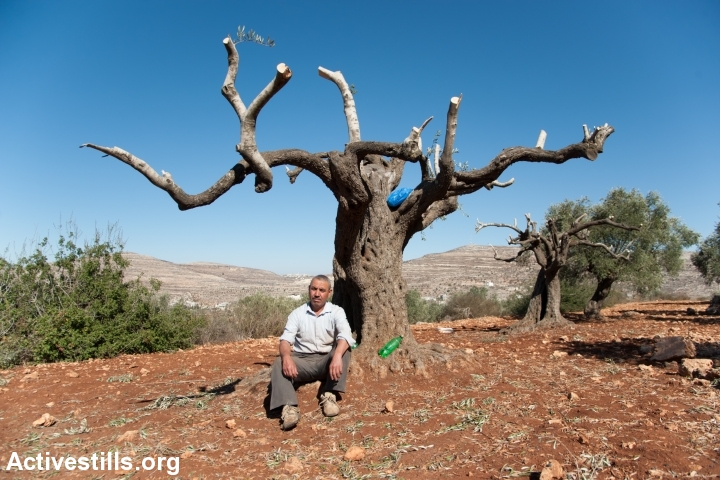The Israeli right-wing likes to claim that Palestinians fabricate the destruction of their olive trees. The police disagrees. Not that they are any good at catching the terrorists.
By Yesh Din, written by Yossi Gurvitz

When you besiege a city a long time, to make war against it in order to capture it, you shall not destroy its trees by swinging an axe against them; for you may eat from them, and you shall not cut them down. For is the tree of the field a man, that it should be besieged by you?
Deuteronomy, 20:19
One of the most common, quiet kinds of settler terrorism, carried out almost on a daily basis in the West Bank, is that of vandalizing trees. Yesh Din has dedicated its new data sheet to this phenomenon.
Destroying crops is an ancient tool of agrarian terror. Its purpose is generally disinheriting farmers from their land for the benefit of others. Aside from the economic damage – and the damage is immense in societies still making much of their living off agriculture – there is the crippling fear that even if you give your all to your crops, even if you wake up at unreasonable hours, even if you work in the blazing sun and the freezing rain, all your work will be in vain, for some human scum will creep up at night and set the fruit of your labor ablaze.
WATCH: Masked settler beats Palestinian with metal pipe
The Bible is quite familiar with this situation:
Thou shalt build an house, and thou shalt not dwell therein: thou shalt plant a vineyard, and shalt not gather the grapes thereof; thine ox shall be slain before thine eyes, and thou shall not eat thereof; thine ass shall be violently taken from before thy face, and shall not be restored to thee; thy sheep shall be given unto thine enemies, and thou shall have none to rescue them; the fruit of thy land, and all thy labors, shall a nation which thou knowest not eat up; and thou shalt be only oppressed and crushed always.
One assumes that the people who skulk about to set fire to and cut down the Palestinians’ trees are as familiar with these verses as I am. Most of them, after all, are allegedly Bible-readers.
Contrary to the common claim among the right wing, these incidents are not a fantasy, nor are they Palestinian fabrications. Yesh Din has followed 211 complaints of damage to trees and other crops submitted to the Judea and Samaria Police District (JSPD) between 2005 and 2013. Out of these cases, 191 were closed.
Only in two cases, i.e. less than one percent of all of the complaints, did the JSPD close the case due to “absence of criminal culpability,” which means that, according to the police, no crime took place. 99% of the incidents of tree-cutting and crop destruction are recognized by the JSPD as actual incidents in which a crime took place. It should be further noted that Yesh Din appealed one of the two cases closed for “absence of criminal culpability.” Jewish right-wingers take note: your hands have despoiled these trees. The number of cases which the JSPD claims there was “absence of criminal culpability” is the same (two) as the number of case files it managed to lose. It is that insignificant.
That does not mean, perish the thought, that the JSPD has actually cracked the cases; this is the JSPD we’re talking about. It fails in galvanizing itself to crack cases dealing with violence against Palestinians – so can one seriously expect it to deal properly with attacks on Palestinian property?
The JSPD has a failure record of 97.4% in such cases, an impressive rate even given its general failure rate of investigation of violence committed by Israelis against Palestinians (84%). The undisputed champion is, of course, the “unknown perpetrator” clause; the JSPD used it to close 166 of these cases. That means that the police failed to find a suspect. In the far second place came the “insufficient evidence” clause, which means that the police identified a suspect but failed to gather sufficiently strong evidence for an indictment. The reason for closing three cases was not reported – and in four cases, only four cases, the JSPD surprisingly presented enough evidence for an indictment.
Four cases out of 211. Less than one in 50. Now think of the message the JSPD sends to the victims and the perpetrators. To the latter it says: there is no point in clinging to the land. This terrorism will go on and there is nothing you can do about it. Do us a favor and stop wasting our time with your complaints – we’ll do nothing about them, anyway. Haven’t you realized how the system works yet?
With the criminals the JPSD hardly speaks a word; it just indulgently pats their heads.
Written by Yossi Gurvitz in his capacity as a blogger for Yesh Din, Volunteers for Human Rights. A version of this post was first published on Yesh Din’s blog.
Read more:
Israeli inaction enables settler violence against Palestinians
Police ignore Palestinian complaint about settler violence
A modest proposal for stopping settler violence
